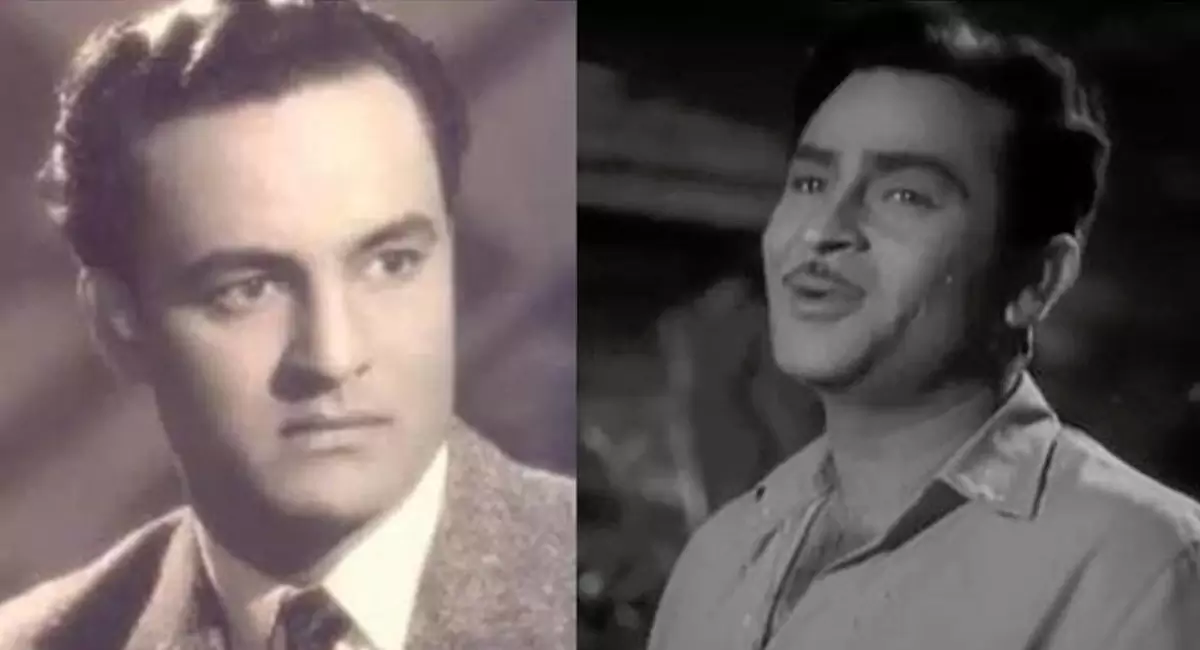
Raj Kapoor’s favourite and also Benazir’s: Mukesh and his melodious career
Few singers are so fated as a later rendition of the song that launched their career happens to be the last one of their life. This Hindi film singer, whose smooth and sonorous voice rendered a gamut of iconic songs for three decades for top heroes from Dilip Kumar to Dharmendra, Raj Kapoor to Rajesh Khanna, and Sunil Dutt to Amitabh Bachchan, was one of these few.
Mukesh, who would have turned 99 on Friday (July 22), rose to prominence with “Dil Jalta Hai” from “Pehli Nazar” (1945), a song he so faithfully essayed in the style of his idol K.L. Saigal that when the legendary singer heard it later, he said it was so strange that he had absolutely no idea of having sung it.
And ‘Dil Jalta Hai”, which he introduced to the audience as his life’s first, was the last one he sang in his 1976 US and Canada concert trip, during which he succumbed to a massive heart attack in Detroit.
As Mukesh became a leading singer, and subsequently, the preferred voice of Raj Kapoor in all his films — those made under the showman’s own R.K. Films banner or otherwise, it was all due to two musical titans who weaned him off being a Saigal clone.
The first was Anil Biswas, who told him that like there could be only one Saigal, there should be only one Mukesh and he should develop his own style, not imitate someone else, and then Naushad Ali, who made him the voice of Dilip Kumar in films such as “Mela” and “Andaz” (also co-starring Raj Kapoor, whose voice was Rafi).
How did the son of a leading Delhi-based engineer who wanted him to follow in his footsteps, end up in the Hindi film industry, and as one of its accomplished singers?
Mukesh Chandra Mathur had displayed an interest in music right from his childhood, convincing his elder sister’s music teacher to tutor him too. After a brief stint in a conventional job, he was lured to Bombay by his relative, actor Motilal, who heard him sing at a family wedding and was impressed by the amount of pathos and sensitivity he could bring to bear in his voice.
Though he began as an actor-singer in “Nirdosh” (1941), Mukesh, as he would be subsequently known, switched to playback with his debut being “Dil Jalta Hai”, pictured as it happens on Motilal itself. And with the way he expresses thrice the final “Dil jalta hai…” with discernible anguish, anyone could be forgiven for thinking it’s Saigal himself.
After he began singing in his own style, Mukesh soon became the favourite of Raj Kapoor, though he sang for many other top and not-so-leading actors too. He was never so prolific as Rafi or Kishore Kumar, but still went on to create such a valuable corpus of melodies that he acquired legions of admirers — from googly maestro B. Chandrashekhar, who was listening to his songs before bowling India to its first victory against England at Lord’s in August 1971, to Pakistan’s late former prime minister Benazir Bhutto, who kept cassettes of his songs in her car while on the campaign trail.
There were ups and downs too — especially a two-year-stint (1954-56), when his decision to become an actor and sing only for himself misfired, and was compounded when he thought of turning producer.
Offers and money soon dried up and he was even forced to withdraw his children from school over unpaid fees. A chastened Mukesh decided to abandon all thoughts of doing anything but what he was best at — and we, his fans, are still benefitting.
Let us look some of his well-known — and lesser-known — songs, beyond the popular Raj Kapoor ones such as “Awara hoon”, “Mera joota hai Japani” and “Jaane kahan gaye woh din”, or “Kabhi kabhi mere dil mein”, for that matter.
“Bade armaanon se rakha hai balam teri kasam”: Among his earliest and much before he picked up a reputation for tragic or angst-filled songs, this duet with Lata Mangeshkar from “Malhaar” (1951) shows that he had a mellow side too for romantic exposition. His old schoolmate Roshan provided the music and Indeevar the lyrics.
“Chhoti si zindagani teri”: In “Aah” (1953), an early Raj Kapoor tragic romance (later amended after negative audience feedback to get a happier ending), Mukesh appears himself as a tonga driver, transporting a sick Raj Kapoor, while singing this sombre reflection on the shortness and impermanence of life. The music was by RK regular Shankar-Jaikishan and the lyrics by Shailendra Singh.
“Zindagi khwab hai”: Made under the RK banner, the avant-garde “Jagte Raho” (1956) was much ahead of its time, but it was also a commercial dud. Another point of disappointment was particularly this song, which marked Mukesh’s comeback, made everyone think it was picturised on Raj Kapoor after it was broadcast on Radio Ceylon. It, however, featured Motilal, playing a rich, drunken sybarite, stumbling down the street. Salil Chowdhury was responsible for the music and Shailendra Singh for the wearily cynical lyrics.
“Aasman pe hai khuda aur zameen pe ham”: This satirical political song – “Chahe kuchh bhi kijiye rokta nahi / Ho rahi hai loot maar, phat rahe hain bam”, penned by who else but Sahir Ludhianvi, was a rather unlikely one for Raj Kapoor, who usually never was so subversively critical. But Mukesh pulled it off with the proper amount of amused indignation. The film was “Phir Subah Hogi” (1958) and Khayyam the music director.
“Aansu bhari hai ye jeevan ki raahen”: No other singer could possibly enunciate pain better than Mukesh, but he never got maudlin, and managed to convey that the angst was not at the cost of self-dignity, tattered though it may be. This song from “Parvarish” (1958) is a case in point, and both Mukesh, and Raj Kapoor on whom it was filmed, display this even when they enunciate lines like “Waade bhula de qasam tod de woh / Halat pe apni hame chhor de woh”. Duttaram gave the music; Hasrat Jaipuri was behind the simple but expressive lyrics.
“Jaoon kahan bataye dil”: In “Chhoti Bahen” (1959), another tearjerker about family relationships starring Balraj Sahni and Nanda, suave character actor Rehman repents his actions that have broken a once-happy family. As he — or rather Mukesh — sings “…chandni aayi ghar jalaane / sujhe na koi manzil”, the regret is palpable from the voice itself, not just the expression. Shankar-Jaikishan contributed the music and Shailendra Singh was the lyricist.
“Haal-e-dil hamara, jaane na bewafa ye zamana”: Sadness but hope for the future is intrinsic to this number in the bit obscure film “Shreeman Satyawaadi” (1960), starring Raj Kapoor and Shakeela. The undercurrent of hope which Mukesh brings to the otherwise sad-sounding lyrics has to be heard to be experienced. The music director was Duttaram and Hasrat Jaipuri wrote the song.
“Mahboob mere … Tu hai to duniya kitni haseen hai”: And if you think Mukesh was only about sorrow and heartbreak, then listen to the duet, in which he conveys intense romance as Manoj Kumar serenades Waheeda Rehman in an exotic setting. The film was “Patthar Ke Sanam” (1967), Laxmikant-Pyarelal the music composers and Majrooh Sultanpuri the lyricist.
“Hum to tere aashiq hai sadiyon puraane”: if you think full-throated yodelling and Elvis Presley-style dances in Hindi films were restricted to the Rafi-Shammi Kapoor numbers, then this song from desi spy caper “Farz” (1967), where a young Jeetendra shows the moves that got him named “Jumping Jack” opposite Babita, who matches pace for pace, and Mukesh has no problems in going full blast. Laxmikant-Pyarelal contributed the music and Anand Bakshi wrote the lyrics.
“Main pal do pal ka shayar hoon”: In “Kabhie Kabhie” (1976), a near-biopic about a legendary poet’s romantic life, Mukesh is the perfect voice as Amitabh Bachchan, to Khayyam’s soulful and evergreen music, makes a frank assessment of a poet’s career and legacy — “Mujhse pahle kitne shayar / aaye aur aa kar chale gaye.” Sahir wrote the lyrics.
There are so many more but let us leave them for his centenary next year.

